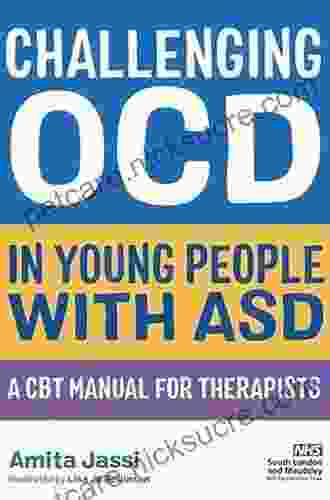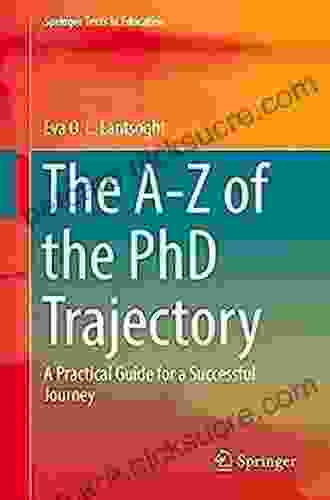Confronting the Interplay: Addressing OCD in Young Individuals with Autism Spectrum Disorder

Autism spectrum disorder (ASD) and obsessive-compulsive disorder (OCD) often coexist, presenting unique and complex challenges for young individuals. Understanding the intricacies of this dual diagnosis is crucial for effective intervention and support. This article delves into the challenges associated with OCD in young people with ASD and explores evidence-based strategies to address them.
1. Increased Anxiety and Sensory Sensitivities:
ASD is characterized by difficulties with social interaction, communication, and repetitive behaviors. OCD often manifests as intrusive thoughts, repetitive actions, or rituals aimed at reducing anxiety. The combination of these two conditions can amplify anxiety and sensory sensitivities, making it difficult for young people to engage in everyday activities.
4.6 out of 5
| Language | : | English |
| File size | : | 794 KB |
| Text-to-Speech | : | Enabled |
| Screen Reader | : | Supported |
| Enhanced typesetting | : | Enabled |
| Word Wise | : | Enabled |
| Print length | : | 109 pages |
2. Obsessions and Rituals Related to ASD Symptoms:
Individuals with ASD may exhibit obsessions and rituals related to their core symptoms, such as:
- Repetitive questioning about social interactions
- Insistence on routines and schedules
- Narrowed interests or preoccupations
These obsessions and rituals can become indistinguishable from the symptoms of ASD, making diagnosis and treatment challenging.
3. Communication Difficulties:
Communication deficits associated with ASD can hinder young people's ability to express their obsessive thoughts and compulsive behaviors. They may struggle to describe their symptoms or understand the rationale behind interventions.
4. Treatment Resistance:
OCD in young people with ASD may be resistant to traditional therapies. Cognitive-behavioral therapy (CBT),the first-line treatment for OCD, can be less effective due to communication difficulties and difficulty engaging in exposure and response prevention (ERP) exercises.
1. Comprehensive Assessment:
A thorough assessment is essential to differentiate between OCD symptoms and the core symptoms of ASD. Clinicians should consider the frequency, intensity, content, and function of obsessions and compulsions to establish a dual diagnosis.
2. Tailored Treatment Plans:**
Behavioral Interventions:** ERP is a highly effective behavioral intervention for OCD. It involves gradually exposing the individual to feared triggers while preventing the compulsive behaviors. Young people with ASD may require modifications to ERP, such as using visual aids, breaking down tasks into smaller steps, and providing more support during exposures.
Cognitive Interventions:** Cognitive therapy helps challenge maladaptive thought patterns that contribute to obsessions and compulsions. Young people with ASD may benefit from techniques that focus on social skill development, self-regulation, and perspective-taking.
Medication:** Selective serotonin reuptake inhibitors (SSRIs) and other medications can help reduce anxiety and obsessive thoughts. However, medication should be used in conjunction with behavioral and cognitive interventions.
3. Family and School Support:
Families and schools play a critical role in supporting young people with ASD and OCD. Family therapy can provide education, support, and strategies for managing symptoms at home. Schools can implement accommodations, such as providing quiet spaces or reducing sensory stimuli, to alleviate anxiety and improve attention.
4. Long-Term Follow-Up:
Individuals with ASD and OCD may require ongoing support and monitoring throughout their lifespan. Regular follow-up appointments, check-ins with families and teachers, and access to mental health services are essential for maintaining progress and preventing relapse.
Challenging OCD in young people with ASD demands a comprehensive approach that acknowledges the unique challenges posed by this dual diagnosis. By conducting thorough assessments, tailoring treatment plans, providing support from families and schools, and engaging in ongoing follow-up, clinicians and educators can empower these individuals to manage their symptoms and live fulfilling lives.
4.6 out of 5
| Language | : | English |
| File size | : | 794 KB |
| Text-to-Speech | : | Enabled |
| Screen Reader | : | Supported |
| Enhanced typesetting | : | Enabled |
| Word Wise | : | Enabled |
| Print length | : | 109 pages |
Do you want to contribute by writing guest posts on this blog?
Please contact us and send us a resume of previous articles that you have written.
 Fiction
Fiction Non Fiction
Non Fiction Romance
Romance Mystery
Mystery Thriller
Thriller SciFi
SciFi Fantasy
Fantasy Horror
Horror Biography
Biography Selfhelp
Selfhelp Business
Business History
History Classics
Classics Poetry
Poetry Childrens
Childrens Young Adult
Young Adult Educational
Educational Cooking
Cooking Travel
Travel Lifestyle
Lifestyle Spirituality
Spirituality Health
Health Fitness
Fitness Technology
Technology Science
Science Arts
Arts Crafts
Crafts DIY
DIY Gardening
Gardening Petcare
Petcare Mark Seidenberg
Mark Seidenberg Broccoli Lion
Broccoli Lion Lindsey Bliss
Lindsey Bliss Scott Matthews
Scott Matthews Teddy Atlas
Teddy Atlas Burt L Standish
Burt L Standish Patricia G Lange
Patricia G Lange Philip Coppens
Philip Coppens Rafael Nadal
Rafael Nadal Aaron T Beck
Aaron T Beck Dan Robson
Dan Robson Leonie Mack
Leonie Mack Laura Luther
Laura Luther Julie K Briggs
Julie K Briggs R I Chalmers
R I Chalmers Irene Spencer
Irene Spencer Livy
Livy Travis Senzaki
Travis Senzaki Geraint Thomas
Geraint Thomas Kristen Thrasher
Kristen Thrasher Arden Rose
Arden Rose Ivana Bajic Hajdukovic
Ivana Bajic Hajdukovic Adam Cesare
Adam Cesare Egerton Ryerson Young
Egerton Ryerson Young Ali Psiuk
Ali Psiuk Pam Jarvis
Pam Jarvis S Elia
S Elia Sean Fitz Gerald
Sean Fitz Gerald Amanda Kingloff
Amanda Kingloff Sarah Thompson
Sarah Thompson Bill Douglas
Bill Douglas Belinia Xenrale
Belinia Xenrale Chip Ingram
Chip Ingram Steve Garratt
Steve Garratt Daniel Todd Gilbert
Daniel Todd Gilbert Julia Rutland
Julia Rutland T M Mikita
T M Mikita Jeanne Oliver
Jeanne Oliver Jim Baggott
Jim Baggott Mike Barrett
Mike Barrett Charlotte Eliopoulos
Charlotte Eliopoulos Kim Dwinell
Kim Dwinell Janice Hudson
Janice Hudson Gill Stewart
Gill Stewart Elizabeth Field
Elizabeth Field 1st Ed 2021 Edition Kindle Edition
1st Ed 2021 Edition Kindle Edition Tyler Lansford
Tyler Lansford Joachim Rossberg
Joachim Rossberg Emily Vikre
Emily Vikre Sara Saedi
Sara Saedi Leona S Aiken
Leona S Aiken Daniel L Schacter
Daniel L Schacter Deborah Spungen
Deborah Spungen Robert Oerter
Robert Oerter Liz Thomas
Liz Thomas Derald Wing Sue
Derald Wing Sue Skylar Kergil
Skylar Kergil Brent Warner
Brent Warner Manjit Kumar
Manjit Kumar Dylan Dethier
Dylan Dethier Raichelle Carter
Raichelle Carter Gary Dierking
Gary Dierking James Adams
James Adams Ray Mcnulty
Ray Mcnulty Raymond Arsenault
Raymond Arsenault Eryk Lewinson
Eryk Lewinson Brian Meier
Brian Meier Mark Santino
Mark Santino Dana Trentini
Dana Trentini Lori Bregman
Lori Bregman Francis L Macrina
Francis L Macrina Monica Beyer
Monica Beyer Gerd Gigerenzer
Gerd Gigerenzer Christian Straube
Christian Straube Phyllis Franklin
Phyllis Franklin Alex Hibbert
Alex Hibbert Paul Gaskell
Paul Gaskell Grace Liu
Grace Liu Jamil Zaki
Jamil Zaki Zachary Willey
Zachary Willey Caroline Fidanza
Caroline Fidanza Joshua Darwin
Joshua Darwin Mara Rutherford
Mara Rutherford Jeff Benedict
Jeff Benedict Nageshwar Sah
Nageshwar Sah Edward Marston
Edward Marston Modestus Anabaraonye
Modestus Anabaraonye The Lodge Company
The Lodge Company Paul Haddad
Paul Haddad Ian Stewart
Ian Stewart Hesam Nemounehkhah
Hesam Nemounehkhah Janet Malcolm
Janet Malcolm Linda L French
Linda L French Andrew Evans
Andrew Evans 1st Edition Kindle Edition
1st Edition Kindle Edition Webb Chiles
Webb Chiles Diane Vaughan
Diane Vaughan Nathan D Lang Raad
Nathan D Lang Raad Dorthe Berntsen
Dorthe Berntsen Aron Ralston
Aron Ralston M L Buchman
M L Buchman Denis Dwyer
Denis Dwyer Jonathan Tarbox
Jonathan Tarbox Traci Chee
Traci Chee Ronald York
Ronald York Spire Study System
Spire Study System Bruce Brown
Bruce Brown Sharon Copeland
Sharon Copeland Richard Pears
Richard Pears Jon Young
Jon Young Ann Olga Koloski Ostrow
Ann Olga Koloski Ostrow Mark Lattanzi
Mark Lattanzi Robin Hobb
Robin Hobb Marva Collins
Marva Collins John Vigor
John Vigor Terry Pratchett
Terry Pratchett Evelyn Raab
Evelyn Raab Cathy Hester Seckman
Cathy Hester Seckman Stanley Vast
Stanley Vast Sarah Lawton
Sarah Lawton Michael Archer
Michael Archer Ewan Mcgregor
Ewan Mcgregor Joan Ryan
Joan Ryan Alan Agresti
Alan Agresti Joshua James
Joshua James William E Glassley
William E Glassley Tillie Cole
Tillie Cole Sandra Uwiringiyimana
Sandra Uwiringiyimana Lars Anderson
Lars Anderson Kajal Gupta
Kajal Gupta Patricia B Mcconnell
Patricia B Mcconnell Robert Lanza
Robert Lanza Estelle Maskame
Estelle Maskame Alexandra Kenin
Alexandra Kenin Alice Roberts
Alice Roberts 1st Ed 2019 Edition Kindle Edition
1st Ed 2019 Edition Kindle Edition Robyn Ryle
Robyn Ryle Stephen Bodio
Stephen Bodio James Proctor
James Proctor Brad Myers
Brad Myers Hafsah Faizal
Hafsah Faizal Carmen Acevedo Butcher
Carmen Acevedo Butcher Matthew B Crawford
Matthew B Crawford Jeffrey S Saltz
Jeffrey S Saltz Megan Sloan
Megan Sloan Geoff Powter
Geoff Powter Shane Benzie
Shane Benzie Forrest Willett
Forrest Willett Naomi Moriyama
Naomi Moriyama Kaoru Sinozaki
Kaoru Sinozaki Paul Johnson
Paul Johnson Piotr Naskrecki
Piotr Naskrecki Katie Singer
Katie Singer M Susan Lindee
M Susan Lindee David I Spivak
David I Spivak George Grimm
George Grimm Joshua G Shifrin
Joshua G Shifrin Tim Hollister
Tim Hollister Keshia A Case
Keshia A Case Michael T Mcdermott
Michael T Mcdermott Sanjay Sarma
Sanjay Sarma Claire Dunn
Claire Dunn Sophie Kinsella
Sophie Kinsella Sarah A Clark
Sarah A Clark Karen Kovacs
Karen Kovacs Tom Chivers
Tom Chivers Karyn Garvin
Karyn Garvin Craig Clapper
Craig Clapper Ian Sample
Ian Sample Louise Warneford
Louise Warneford S K Gupta
S K Gupta Chris J Ellis
Chris J Ellis Knowledge Tree
Knowledge Tree Peter Heller
Peter Heller Kiley Reid
Kiley Reid Bill Rodgers
Bill Rodgers Janice K Ledford
Janice K Ledford Sarah A Reinhard
Sarah A Reinhard Robert Milner
Robert Milner Derek Rowntree
Derek Rowntree Editions La Plume D Eros
Editions La Plume D Eros Tadahiko Mizuno
Tadahiko Mizuno Paul A Laviolette
Paul A Laviolette Robert Clifton Robinson
Robert Clifton Robinson Mae Ilami Onyekwum
Mae Ilami Onyekwum Mike Chappell
Mike Chappell Robyn Perry Worthington
Robyn Perry Worthington Christine E Sleeter
Christine E Sleeter Ben Rothenberg
Ben Rothenberg Nancy B Rapoport
Nancy B Rapoport Robert Irwin
Robert Irwin Alexandra Witze
Alexandra Witze Taylor Fontenot
Taylor Fontenot Asti Hustvedt
Asti Hustvedt Christa Mackinnon
Christa Mackinnon Jane Yeadon
Jane Yeadon Peter Hessler
Peter Hessler Daniel Scott
Daniel Scott David Weber
David Weber Mark Vee John
Mark Vee John John L Havlin
John L Havlin Kara Goucher
Kara Goucher Carol Lynn Mckibben
Carol Lynn Mckibben David Barrett
David Barrett Jamie Dorobek
Jamie Dorobek Jonathan Vaughters
Jonathan Vaughters Jo Bartlett
Jo Bartlett Nicole Libin Phd
Nicole Libin Phd Chris Stringer
Chris Stringer Andrea Olson
Andrea Olson 1st Ed 2018 Edition Kindle Edition
1st Ed 2018 Edition Kindle Edition Geoff Johns
Geoff Johns Ben Coates
Ben Coates Chris Parsons
Chris Parsons Eric Sevareid
Eric Sevareid Alice Waters
Alice Waters Karen L Cox
Karen L Cox Adeline Yen Mah
Adeline Yen Mah Jean Pierre De Caussade
Jean Pierre De Caussade Charles Fleming
Charles Fleming Jacqueline Carey
Jacqueline Carey Monte Burch
Monte Burch Berkshire K Greene
Berkshire K Greene Jamie Whyte
Jamie Whyte Vikas Bhushan
Vikas Bhushan Richard Hofstadter
Richard Hofstadter 1st Ed 2017 Edition Kindle Edition
1st Ed 2017 Edition Kindle Edition Raven Morgaine
Raven Morgaine Bob Chandler
Bob Chandler Ruth Ware
Ruth Ware Bilingual Edition Kindle Edition
Bilingual Edition Kindle Edition Peter Burns
Peter Burns Bud Hasert
Bud Hasert Bob Allcorn
Bob Allcorn John T Cacioppo
John T Cacioppo Day Schildkret
Day Schildkret David Clark
David Clark House Of Talent
House Of Talent Pam Vredevelt
Pam Vredevelt Natsuki Takaya
Natsuki Takaya Michael Schiavone
Michael Schiavone Lisa R Cohen
Lisa R Cohen Kev Reynolds
Kev Reynolds Anthony Burgess
Anthony Burgess Diane H Tracey
Diane H Tracey Deborah T Goldberg
Deborah T Goldberg Lh Press
Lh Press Nick Redfern
Nick Redfern Yaron Seidman
Yaron Seidman Amanda Claridge
Amanda Claridge My Daily German
My Daily German Wabun Wind
Wabun Wind Michael R Canfield
Michael R Canfield Carol Matsuzaki
Carol Matsuzaki David Roberts
David Roberts Alexandre Paiva
Alexandre Paiva Pat Manley
Pat Manley Glenda Green
Glenda Green Suzy Hopkins
Suzy Hopkins Steve Crawford
Steve Crawford Taran Matharu
Taran Matharu Sara Snow
Sara Snow Neil Sagebiel
Neil Sagebiel Tim Deroche
Tim Deroche Phil Mickelson
Phil Mickelson Lisa Marasco
Lisa Marasco Jesse M Ehrenfeld
Jesse M Ehrenfeld Samuel Owedyk
Samuel Owedyk Richard E Nisbett
Richard E Nisbett Bradmd
Bradmd Harry Fisch
Harry Fisch Hana Ali
Hana Ali Mayim Bialik
Mayim Bialik Gail Buckland
Gail Buckland Philippa Langley
Philippa Langley Intelligent
Intelligent Andrew Solomon
Andrew Solomon Karl Rehn
Karl Rehn Emily Chetkowski
Emily Chetkowski Christopher Carter
Christopher Carter Mambo Chita Tann
Mambo Chita Tann Irina Szmelskyj
Irina Szmelskyj Larry A Yff
Larry A Yff Matthew Dworak
Matthew Dworak Beryl Beare
Beryl Beare Judith Warner
Judith Warner Alison Pray
Alison Pray J F Tamayo
J F Tamayo Xiufeng Liu
Xiufeng Liu Morten H Christiansen
Morten H Christiansen Mary Douglas
Mary Douglas Holly Hook
Holly Hook Otto Toeplitz
Otto Toeplitz Susan Alcorn
Susan Alcorn Jacob Cohen
Jacob Cohen Jill Heinerth
Jill Heinerth Gerald Beaudry
Gerald Beaudry Elizabeth Heavey
Elizabeth Heavey Michelle Damiani
Michelle Damiani Alan Naldrett
Alan Naldrett Christian Fader
Christian Fader Clark A Campbell
Clark A Campbell R K Agarwal
R K Agarwal Jody Morse
Jody Morse David Wolff
David Wolff Samantha Boardman
Samantha Boardman Darril Fosty
Darril Fosty Peter Lightbown
Peter Lightbown John S Farnam
John S Farnam Janet Godwin
Janet Godwin Philip Moore
Philip Moore Bryn Huntpalmer
Bryn Huntpalmer Isa Herrera
Isa Herrera Stephen C Meyer
Stephen C Meyer Harvey Penick
Harvey Penick Michael Clarke
Michael Clarke Elise Hennessy
Elise Hennessy Hannu Rajaniemi
Hannu Rajaniemi Felicia Pizzonia
Felicia Pizzonia Dierdre Wolownick Honnold
Dierdre Wolownick Honnold Ashley Stanford
Ashley Stanford Shalini Shankar
Shalini Shankar R J Vickers
R J Vickers Mildred Council
Mildred Council Arny Alberts
Arny Alberts Ron Larson
Ron Larson Carola Hein
Carola Hein Graham Priest
Graham Priest Edward A Bell
Edward A Bell Jean Yves Leloup
Jean Yves Leloup Gary M Schultheis
Gary M Schultheis Laura Prepon
Laura Prepon Michele Smith
Michele Smith Botros Rizk
Botros Rizk Franz Boas
Franz Boas Andy Kirkpatrick
Andy Kirkpatrick Disha Experts
Disha Experts Maureen Dempsey
Maureen Dempsey Adam Rutherford Phd
Adam Rutherford Phd Lawrence T Friedhoff
Lawrence T Friedhoff Erfun Geula
Erfun Geula Jandy Nelson
Jandy Nelson Karina Manta
Karina Manta Lech A Grzelak
Lech A Grzelak Leonard Sax
Leonard Sax Anton Angelov
Anton Angelov Ejike Ifeanyichukwu
Ejike Ifeanyichukwu Rollo Tomassi
Rollo Tomassi David Kahn
David Kahn Kay Kennedy
Kay Kennedy Randall M Packard
Randall M Packard Mark Miller
Mark Miller Seth Tucker
Seth Tucker Rick Barba
Rick Barba Guy Harrison
Guy Harrison 1st Ed 2016 Edition Kindle Edition
1st Ed 2016 Edition Kindle Edition Rachel Reed
Rachel Reed Doug Degrood
Doug Degrood Rosemary Ellen Guiley
Rosemary Ellen Guiley Jareth Tempest
Jareth Tempest Rachael Bell Irving
Rachael Bell Irving David Fine
David Fine Florence Nightingale
Florence Nightingale Lou Nanne
Lou Nanne Evy Poumpouras
Evy Poumpouras Guillermo Gonzalez
Guillermo Gonzalez Kyler Shumway
Kyler Shumway Saroo Brierley
Saroo Brierley Maia Motley
Maia Motley Tim Powers
Tim Powers James Ragonnet
James Ragonnet Elaine Heney
Elaine Heney James M Tabor
James M Tabor Roger Frampton
Roger Frampton Stephen R Lawhead
Stephen R Lawhead Ashlee Kasten
Ashlee Kasten Anthony Haynes
Anthony Haynes Rebecca Solnit
Rebecca Solnit Dk Publishing
Dk Publishing Paul Annacone
Paul Annacone Lavinia Collins
Lavinia Collins Gary E Schwartz
Gary E Schwartz Jay Cassell
Jay Cassell Felicity Cloake
Felicity Cloake Diana Papaioannou
Diana Papaioannou Alan Greenfield
Alan Greenfield Anne Polli
Anne Polli Os Guinness
Os Guinness Mindfulness Hypnosis Academy
Mindfulness Hypnosis Academy Paul Freedman
Paul Freedman Amanda Brooks
Amanda Brooks Robyn Hawkins
Robyn Hawkins Leslie Anthony
Leslie Anthony Joseph Mercola
Joseph Mercola Michael Ross
Michael Ross Marisa Kanter
Marisa Kanter Orji Onyebuchi
Orji Onyebuchi Dr Mike Grevlos
Dr Mike Grevlos Lynne Tolley
Lynne Tolley Jacob Gardner
Jacob Gardner David Faulkner
David Faulkner Jacqueline Corricelli
Jacqueline Corricelli Joanne Calderwood
Joanne Calderwood Nicole Zasowski
Nicole Zasowski Wolfgang Jank
Wolfgang Jank Lenora Chu
Lenora Chu Jeremy Bhandari
Jeremy Bhandari Nick Morrison
Nick Morrison Susan Ludington Hoe
Susan Ludington Hoe Wendy Sullivan
Wendy Sullivan Vaclav Smil
Vaclav Smil Six Sisters Stuff
Six Sisters Stuff Desiree Trattles
Desiree Trattles Dinah Bucholz
Dinah Bucholz Keith Bowden
Keith Bowden Fern Nichols
Fern Nichols Ric Conrad
Ric Conrad Jacob Stegenga
Jacob Stegenga Andrea Sfiligoi
Andrea Sfiligoi Launi Meili
Launi Meili Ann Jackson
Ann Jackson Daisaku Ikeda
Daisaku Ikeda Wendy Higgins
Wendy Higgins Cathy Raubenheimer
Cathy Raubenheimer Valerie Nash Chang
Valerie Nash Chang Joyce L Vedral
Joyce L Vedral Mike Lanza
Mike Lanza Bruce Chatwin
Bruce Chatwin Brent E Turvey
Brent E Turvey Nancy Hendrickson
Nancy Hendrickson Rana Conway
Rana Conway Matthew Harffy
Matthew Harffy Lei Wang
Lei Wang Sharon Wilkins
Sharon Wilkins Ellie Marney
Ellie Marney George Mount
George Mount Ivor Horton
Ivor Horton Erin Miller
Erin Miller Teri Tom
Teri Tom Latham Thomas
Latham Thomas Frank Wilczek
Frank Wilczek Perre Coleman Magness
Perre Coleman Magness Russ Moorhouse
Russ Moorhouse Brian Fagan
Brian Fagan Loudell F Snow
Loudell F Snow Pete Magill
Pete Magill Robert Chu
Robert Chu Alison Gopnik
Alison Gopnik Chad Waterbury
Chad Waterbury Kathy Farrokhzad
Kathy Farrokhzad Duncan Hamilton
Duncan Hamilton Fletcher Dunn
Fletcher Dunn 1st Ed 2020 Edition Kindle Edition
1st Ed 2020 Edition Kindle Edition Stacey Steinberg
Stacey Steinberg Jerome Rand
Jerome Rand Kim Mack Rosenberg
Kim Mack Rosenberg Barry Ord Clarke
Barry Ord Clarke Nicholas J Saunders
Nicholas J Saunders John Small
John Small Michael Borenstein
Michael Borenstein Helen Batten
Helen Batten Christopher Hook
Christopher Hook Didier Reiss
Didier Reiss Lani Forbes
Lani Forbes Thomas Lickona
Thomas Lickona Elizabeth Becker
Elizabeth Becker Harold Simmons
Harold Simmons Daniel H Pink
Daniel H Pink Helen Garabedian
Helen Garabedian Will Nett
Will Nett Norman Delgado
Norman Delgado 15th Edition Kindle Edition
15th Edition Kindle Edition Jay Carter
Jay Carter Mike Bender
Mike Bender Sally A Lipsky
Sally A Lipsky Shane Jones
Shane Jones Heather A Smith
Heather A Smith Robert Lomas
Robert Lomas John Toussaint
John Toussaint Kathleen Buckstaff
Kathleen Buckstaff Cal Peternell
Cal Peternell Julie Angus
Julie Angus Natalia Molina
Natalia Molina H Lee Jones
H Lee Jones Timothy R Pauketat
Timothy R Pauketat Larry Krieger
Larry Krieger Amita Jassi
Amita Jassi D James Benton
D James Benton Jack Newfield
Jack Newfield 6th Edition Kindle Edition
6th Edition Kindle Edition Jeremy Lent
Jeremy Lent Larry Kaniut
Larry Kaniut Rebekah Dodson
Rebekah Dodson Jason Sumner
Jason Sumner Ukay J Ekong
Ukay J Ekong Clifford E Trafzer
Clifford E Trafzer Tamonya Sands
Tamonya Sands Timothy Dickeson
Timothy Dickeson
Light bulbAdvertise smarter! Our strategic ad space ensures maximum exposure. Reserve your spot today!
 Desmond FosterFollow ·13.1k
Desmond FosterFollow ·13.1k David BaldacciFollow ·18.3k
David BaldacciFollow ·18.3k Camden MitchellFollow ·9.8k
Camden MitchellFollow ·9.8k Lucas ReedFollow ·2.9k
Lucas ReedFollow ·2.9k Albert ReedFollow ·13.2k
Albert ReedFollow ·13.2k Harrison BlairFollow ·19.9k
Harrison BlairFollow ·19.9k Guy PowellFollow ·9.3k
Guy PowellFollow ·9.3k Jaime MitchellFollow ·19.3k
Jaime MitchellFollow ·19.3k

 Marcus Bell
Marcus BellThe Essential Guide to Angler Quick Reference: Your...
Embark on an unforgettable...

 Juan Butler
Juan ButlerThe Lupatus Stone: A Wicked Conjuring
The Lupatus Stone is a...

 Alvin Bell
Alvin BellUnveiling the Enchanting Memoirs of Lady Hyegyong: A...
In the annals of Korean...

 DeShawn Powell
DeShawn PowellAMC's Best Day Hikes in the Berkshires: Explore Majestic...
The Berkshires, a...

 Clark Campbell
Clark CampbellRewilding The Urban Soul: Reconnecting with Nature in the...
In the heart of sprawling metropolises, where...

 Cruz Simmons
Cruz SimmonsHow to Find Your Family History on a Genealogy Website: A...
Delving into the...
4.6 out of 5
| Language | : | English |
| File size | : | 794 KB |
| Text-to-Speech | : | Enabled |
| Screen Reader | : | Supported |
| Enhanced typesetting | : | Enabled |
| Word Wise | : | Enabled |
| Print length | : | 109 pages |












